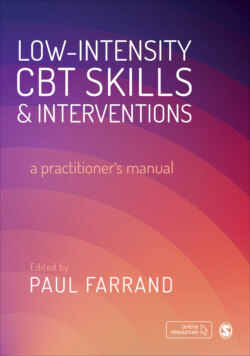Читать книгу Low-intensity CBT Skills and Interventions - Группа авторов - Страница 131
На сайте Литреса книга снята с продажи.
Key Point
ОглавлениеCore symptoms:
Experiencing a traumatic event
Re-experiencing the traumatic event – having vivid intrusive memories, flashbacks or repeated nightmares about the event
Avoiding or wanting to avoid reminders of the event or things associated with the event.
Common symptoms:
Difficulty fully recalling some important aspects of the traumatic event
Increased psychological sensitivity or arousal – difficulty falling or staying asleep, irritability, angry outbursts, concentration difficulties, hypervigilance or easily startled.
Symptoms must have occurred within six months of the traumatic event. Delayed onset PTSD, where symptoms occur beyond six months, is considered a separate diagnosis and is often preceded by other signs of mental distress including alcohol misuse. Experiencing a traumatic event does not necessarily lead to PTSD, and other mental health problems can be more common following traumatic events, including depression, panic disorder, agoraphobia and alcohol misuse (Fear et al., 2010). These are also commonly co-morbid with PTSD (McFarlane and Papay, 1992).
